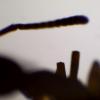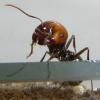https://www.nature.c...586-022-05480-9
Snir et al. 2022.
Main takeaways....
- Molting fluid, typically reabsorbed by the pupating insect before eclosion, is actually excreted by pupae as a kind of "milk" that is consumed by adults and larvae in ants. The presence of regulatory chemicals, enzymes, and hormones means it likely impacts all life stages within the colony.
"These include all essential amino acids, multiple carbohydrates including GlcNAc, nucleic acids and vitamins (Fig. 2c, Extended Data Fig. 4)."
- Pupae are active participants in colony health and survival. Without pupae, larvae grow slower and survive at lesser rates.
- Every group of ants has this 'ant milk'. It is conserved across all subfamilies, meaning ants have almost always had this adaptation.
What does this mean for antkeeping?
We don't know much yet. But... it does tell us something interesting. That being that all life stages are important.
Early colony development and social parasites seem like interesting areas for work to be done.
Furthermore, it has been demonstrated by members here on occasion that colonies 'boosted' by pupae sometimes survive better than those which aren't. This may provide some additional reasoning as to why.

















